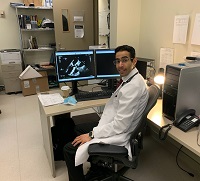Did you know an estimated 4.6 million Canadians have hypertension? 
Hypertension, more commonly known as high blood pressure, is a common condition where the pressure against the blood vessel walls in the body is too high, says Dr. Aws Almufleh, who is a cardiologist and the physician lead of the Heart Function Clinic at Kingston Health Sciences Centre (KHSC). Dr. Almufleh started at Queen’s in September 2021 and his clinical role includes providing in-patient and ambulatory care for patients with heart failure, as well as performing and interpreting echocardiography studies.
As a heart failure specialist, Dr. Almufleh’s work is intimately related to hypertension. “In Canada, hypertension is a very common cause of heart failure, second only to coronary artery disease (which is also increased among patients with untreated or poorly-controlled high blood pressure),” he describes. “In my clinic visits with patients, I dedicate sufficient time to explain the hazards of high blood pressure and the importance of keeping it under control. This is an area where partnership with family physicians is very important as we work together to emphasize healthy lifestyle changes and adjust medications to ensure the patients’ blood pressure is under control.”
In his area of research, Dr. Almufleh is focusing on care of heart failure patients in the inpatient and outpatient settings. “Currently, we are preparing to start a quality improvement initiative on the cardiac and internal medicine floors of KHSC to ensure that patients with heart failure receive all the guideline-recommended treatments which will hopefully improve their clinical outcomes. Of course, controlling hypertension is integral to the success of this project,” he says.
Dr. Almufleh emphasizes in his practice that patients with uncontrolled hypertension feel no symptoms at all. “There is one pervasive misconception among some patients: they think that as long as they do not have headaches, blurred vision or fatigue, their blood pressure is well-controlled,” he explains. “However, chronic elevation of blood pressure -even when asymptomatic- places patients at a high risk of developing several complications including having a heart attack, stroke and/or heart failure.” Hypertension gets serious when it is poorly controlled for a prolonged period of time, according to Dr. Almufleh. He says, “I like to explain to my patients that blood pressure is the pressure against which the heart has to beat every second of the day. It is okay for our pressures to increase momentarily when we are anxious, afraid or upset, but if this happens all day long, over time, the heart will start suffering, and some patients could develop heart weakness or stiffness (heart failure).”
Of the 4.6 million Canadians with hypertension, nearly 20 per cent are unaware of their disease, and one-third of patients diagnosed with hypertension have uncontrolled blood pressures. Dr. Almufleh says there are two main gaps in hypertension care. “One is the lack of systematic methods to identify patients with high blood pressure early on, and the second is lack of consistent mechanisms to monitor patients’ blood pressure at home and adjust their medications,” he explains. “Bridging these gaps will undoubtedly yield improved outcomes for many Canadians. It is worth noting that KHSC is leading the way in establishing academic-community partnerships which will empower primary care providers to detect and manage cardiovascular risk factors including hypertension. Another area where KHSC has made strides is establishing virtual care programs to enable close monitoring and treatment of patients’ high blood pressure in the comfort of their own homes.”
